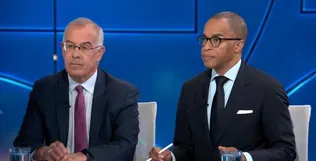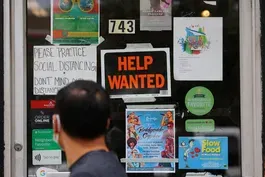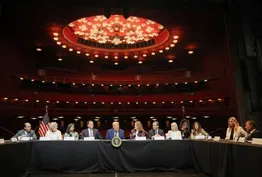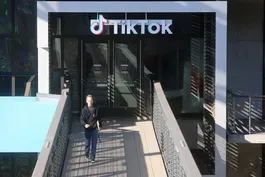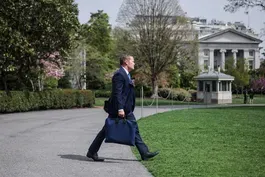
Trade war and tariffs drag markets to worst week in years
Clip: 4/4/2025 | 6m 59sVideo has Closed Captions
Trade war, tariffs and uncertainty drag markets to worst week in years
Stocks were in free fall again Friday as markets saw their worst week in years. The trade war heated up as China responded to President Trump with their own 34 percent tariffs on imported U.S. goods. Markets fell further after Federal Reserve Chair Jerome Powell said the tariffs are expected to lead to higher prices and weaken the economy. Amna Nawaz discussed more with Justin Wolfers.
Problems with Closed Captions? Closed Captioning Feedback
Problems with Closed Captions? Closed Captioning Feedback
Major corporate funding for the PBS News Hour is provided by BDO, BNSF, Consumer Cellular, American Cruise Lines, and Raymond James. Funding for the PBS NewsHour Weekend is provided by...

Trade war and tariffs drag markets to worst week in years
Clip: 4/4/2025 | 6m 59sVideo has Closed Captions
Stocks were in free fall again Friday as markets saw their worst week in years. The trade war heated up as China responded to President Trump with their own 34 percent tariffs on imported U.S. goods. Markets fell further after Federal Reserve Chair Jerome Powell said the tariffs are expected to lead to higher prices and weaken the economy. Amna Nawaz discussed more with Justin Wolfers.
Problems with Closed Captions? Closed Captioning Feedback
How to Watch PBS News Hour
PBS News Hour is available to stream on pbs.org and the free PBS App, available on iPhone, Apple TV, Android TV, Android smartphones, Amazon Fire TV, Amazon Fire Tablet, Roku, Samsung Smart TV, and Vizio.
Providing Support for PBS.org
Learn Moreabout PBS online sponsorshipGEOFF BENNETT: Welcome to the "News Hour."
Stocks were in freefall again today, ending the market's worst week in years as a trade war with China heated up over tariffs.
The losses were widespread, with the Dow down 5.5 percent today.
The Nasdaq dropped nearly 6 percent and has now entered bear market territory, meaning it's down at least 20 percent from its recent high.
And the benchmark S&P 500 dropped by nearly 6 percent.
That's more than 10 percent in the last two days alone.
It came in spite of a strong jobs report that came in much higher than expected.
228,000 new jobs last month.
AMNA NAWAZ: The markets were focused on the escalating trade battles, dropping sharply after China responded to President Trump's Wednesday tariffs with their own, 34 percent on all imported U.S. goods.
Markets also fell after Federal Reserve Chair Jerome Powell said tariffs are expected to lead to higher prices and to weaken the economy.
JEROME POWELL, Federal Reserve Chairman: Inflation is going to be moving up and growth is going to be slowing, but it isn't really -- it's -- to me, it's not clear at this time what the appropriate path for monetary policy will be.
AMNA NAWAZ: For more on the latest, I'm joined now by Justin Wolfers.
He's professor of economics and public policy at the University of Michigan.
Professor Wolfers, welcome back to the "News Hour."
Thanks for joining us.
JUSTIN WOLFERS, University of Michigan: I wish I was here with good news, mate.
AMNA NAWAZ: Well, let's talk about the latest news.
As you saw there, another tough day for the markets in reaction to those tariffs.
Tell me how you're looking at this.
I mean, how much can you really read into these first 48 hours of investors and traders reacting?
Is it a lot or is it too early to tell?
JUSTIN WOLFERS: Oh, I think definitely a lot.
One of the phrases one keeps hearing out of the administration is short-term pain the long-term gain.
Now, if that were true, buying stocks would be a good idea, because if we get long-term gain, American companies -- that's who these tariffs are meant to help -- would become more valuable, in which case investors would be bidding up their value.
So what you're seeing here is a very clear evaluation from the market that this is not only short-term pain.
They're anticipating long-term pain to go with it as well.
AMNA NAWAZ: You have, as you mentioned, seen the president's arguments about the short term pain.
He also argues this is about fundamentally reshaping the American economy, right, boosting manufacturing, encouraging more investment.
They point to some of those large amounts of investment that have been coming in, in recent weeks.
Could these tariffs -- given enough time, could they have some of those intended impacts?
JUSTIN WOLFERS: No.
And, unfortunately, we have the White House chaos to blame for this.
Look, here's the theory.
You try and make it more attractive for companies to build their factories in the United States, rather than elsewhere.
That's -- so far, that makes sense.
Here's the problem.
When I go to build a factory today, that factory's not going to be complete for another three, four or five years.
And then that factory's going to exist for several decades after that.
That means my decision about whether to build in the United States has nothing to do with tomorrow's tariffs, but rather has everything to do with my expectations of tariffs in five years' time and through the decades after that.
The problem is, this is a chaotic White House.
When they announce tariffs on Wednesday, you're not sure they're still going to be there on Thursday.
No one in the business community feels confident that they know the status of tariffs next week, next year, let alone what really matters, which is next decade.
As a result, we're going to get all the costs of the tariffs, but none of those benefits.
AMNA NAWAZ: Is there still a chance, though, because we have seen some statements of support the White House has been pushing out from the Steel Manufacturers Association, the National Cattlemen's Beef Association -- could certain sectors benefit from these policies?
JUSTIN WOLFERS: Oh, it's absolutely the case that if you prevented Australian beef coming to American shores, two things are true.
American beef farmers would sell more beef and Americans would eat lower-quality beef on average.
That definitely could happen, but is it worth it?
Remember, a lot of these tariffs are about - - tariffs apply just as much to beef as they apply to coffee.
America doesn't grow coffee.
We could put the tariffs up to infinity and they're not going to do anything to help us grow coffee here in the United States.
All they're going to do is tax American consumers.
AMNA NAWAZ: The fact that we're already seeing some countries, particularly from Southeast Asia, step in to say, we want to negotiate, we will lower our tariffs, let's buy more American goods, is that a sign to you that some of this strategy by the White House is working?
JUSTIN WOLFERS: No.
That sounds strange to say, right, which is it sounds like we're getting concessions.
But here's the thing.
When Trump was young, it was true that many of our trading partners had high tariffs.
Today, they don't.
Take one of the countries that gave one of these big concessions today, Vietnam.
Vietnam said it will cut its tariffs.
But here's the thing.
Vietnam's preexisting level of tariffs was already only 1 percent.
So what we have is, we have started the trade war.
The gains we get might be that some of our trading partners reduce their tariffs by 1 percentage point.
That's happening at the same time that we're getting retaliatory tariffs from China of 34 percent.
So the problem here is, even if we win, we don't win very much.
And along the way, we're accruing a whole heck of a lot of damage.
AMNA NAWAZ: Professor, I want to put to you the bigger picture argument that we have heard again and again that people who support these policies make in support of President Trump, people like Mark DiPlacido, who's a trade policy adviser at the conservative group American Compass.
He writes basically that the whole free trade paradigm has already imposed immense costs on millions of Americans.
Here's what he says: "For the millions of U.S. workers and families who've lost their jobs and communities to globalization, the catastrophe has already happened.
Cheap foreign goods do not make up for those losses."
What do you make of that argument?
JUSTIN WOLFERS: Look, here's the problem with doing media economics.
It's always possible for an enterprising journalist to ring around and find the one economist in the entire country who's willing to defend the administration's policies.
But then that gives your viewers an unrepresentative view.
So you will quote him, and then you will have me on the other side.
But the thing is, my -- what I have been describing so far, which is that economists think that these are going to be destructive, is really the representative opinion of almost every other economist in the country.
And, look, you don't have to believe me.
If he were right that tariffs are the solution, that should lead American businesses to become more profitable.
And if that were true, folks on Wall Street would be rushing to buy the stock of American businesses.
They're not.
They're selling that stock because they're really worried this is going to be even more destructive than the sorts of concerns that he has.
AMNA NAWAZ: That is Professor Justin Wolfers of the University of Michigan joining us tonight.
Professor, thank you for your time.
Really appreciate it.
JUSTIN WOLFERS: A pleasure.
Brooks and Capehart on political reaction to Trump's tariffs
Video has Closed Captions
Brooks and Capehart on the political reaction to Trump's tariffs (10m 17s)
Fired federal workers struggling to land new jobs
Video has Closed Captions
Fired federal workers struggling to land new jobs in tightening white-collar sector (6m 44s)
How NCAA's transfer portal transformed March Madness
Video has Closed Captions
How NCAA's transfer portal transformed March Madness (6m 8s)
Kennedy Center at a crossroads as it's pulled into politics
Video has Closed Captions
Kennedy Center faces a crossroads as it's pulled into partisan politics (9m 4s)
News Wrap: Trump gives TikTok more time to find U.S. buyer
Video has Closed Captions
News Wrap: Trump gives TikTok another 75 days to find American buyer to keep app running (6m 19s)
Trump shakes up NSA amid pressure from right-wing activist
Video has Closed Captions
Trump abruptly shakes up NSA leadership amid pressure from right-wing activist (5m 52s)
Providing Support for PBS.org
Learn Moreabout PBS online sponsorshipSupport for PBS provided by:
Major corporate funding for the PBS News Hour is provided by BDO, BNSF, Consumer Cellular, American Cruise Lines, and Raymond James. Funding for the PBS NewsHour Weekend is provided by...
